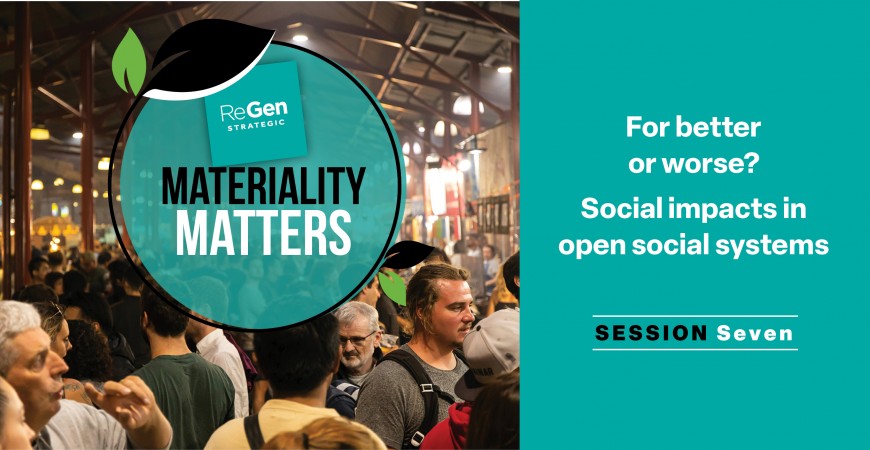When did ‘ethics’ become such an unpopular word? It seems to have been replaced by the prefix ‘social’ as a rather befuddling euphemism for ‘ethical’. Think social impact, social innovation, social performance, social accounting, corporate social responsibility, the ‘S’ in ESG - and the list goes on.
How did the ethically neutral word ‘social’ take on such a mantle of moral authority?
In my early career, ethics was core to my role as an in-house compliance and integrity practitioner. As legal compliance gradually became less acceptable as a proxy for business ethics during the mid to late 2010s, the word ‘social’ started to bump the word ‘ethical’ out of view.
It was an exciting time. Increasing use of the word social in business contexts, including in terms such as ‘social impact’, was a symptom of the mindset shift that people were going through in acknowledging that economic markets are open social systems (also known as human or organisational complex adaptive systems).
In open social systems, environmental and social issues are not strictly external to businesses or the markets they operate in. Rather, they pass in and out of the permeable boundary between businesses and society as part of the everyday push and pull of events and ideas which interact with an organisation’s people and their activities. For example, mobile phone businesses developed product and process innovations which integrated people’s environmental concerns related to the lifecycle of handsets, including how handsets are produced and recycled (D’Antone et al, 2017).
Acknowledging that markets are open social systems opened up fresh ways of looking at and shaping our economic markets with ESG interests. Yet within the ESG movement, the word ethics seems to have become about as popular as rum-raisin ice cream. Consequently, there is often a false boundary between an organisation’s ethics function and its ESG function.
In leaping to embrace the reality of economic markets as open social systems, we missed the point that ‘social’ does not necessarily equate to ‘ethical’. We can use the power of open social system dynamics to shape businesses and the markets they operate towards enhancing human dignity and well-being, or towards generating ever-greater global instability and inequality (for a deeper discussion on market shaping, see Nenonen & Storbacka, 2018). It is our ethics that guide the direction our market shaping will take, and whether the impacts we create as a result are for better or worse.
Neither are ethics a monolithic constant. People’s ethics vary wildly in today’s constantly shifting landscape of information and meaning, even among those physically grouped in the same social locality or bound by other kinds of community identity. Leading a business in this environment without tools to navigate ethical grey areas is like walking into Jumanji without the map.
Lack of ethical way finding can side-track (or worse, backfire on) even the most well-intentioned businesses trying to work for social impact. Their staff and collaborators end up talking over each other’s heads and getting nowhere, because they haven’t first asked questions like:
● If social impact means social change, does it mean bad change (as is the implication in social impact assessment) or good change (as is the implication in social impact measurement and other methods of evaluation)?
● What do we think good social change looks like?
● Does it have to be on a large scale to be good (or bad), or is it ok if we only impact a few individuals?
● Is generating good social change an imperative for our organisation, and why?
● Are there limits to our responsibility for social change, and what are they?
● What if the positive social impacts we make with this program/collaboration/activism are offset by negative impacts of our core business products and activities?
● Have we asked the people whose lives we want to change what they think good (or bad) social change looks like?
● When differences of opinion about which impacts are more important arise, whose opinion counts for more?
In other words - what are the ethics of what we’re planning to do here?
Lack of ethical clarity fuels already polarised debates about ESG and the propriety of layering social or environmental issues into businesses. Classic ‘the social is external’ Friedman (1970) followers argue that it is not the place of businesses to influence social issues – that’s the job of a democratically elected legislature. In response, the pro-ESG camp has turned to codifying social and environmental concerns into ESG frameworks and then into legislation.
Does this mean we should take our interest in business ethics and just hop back into the compliance box?
I tend to agree with Alison Taylor (2024), who convincingly argues that while business ethics reach far beyond the remit of legal compliance, businesses neither can nor should solve all social ills. Instead, they should focus on making their core products well; cleaning up their messes; doing no harm; and treating humans with dignity and respect. Simple, right? Yes … and no. As Taylor says, ‘the devil is in the how’.
The ‘how’ needs to be tailored to an individual organisation’s context, yet there are some common helpful approaches. These include social and environmental assessments, plans, strategies and due diligence that combine research methods with a management reporting style, such as social and human rights impact assessments, materiality assessments, community needs assessments, transition plans and social investment strategies. Meaningful community and other stakeholder engagement is indispensable to the process of preparing these kinds of documents.
The ‘social’ words (social impact, social innovation, social performance, ESG) are still central to accessing a global shared conversation about ethical business practices, but are best used reflectively, as a gateway to understanding and implementing ethical decision making. Just as important as the word ‘social’, is the word ‘impact’. Knowledge of the impacts - both positive and negative – that an organisation’s activities have on people and the environment are key to chartering an ethical pathway forward.
 ReGen Strategic
ReGen Strategic